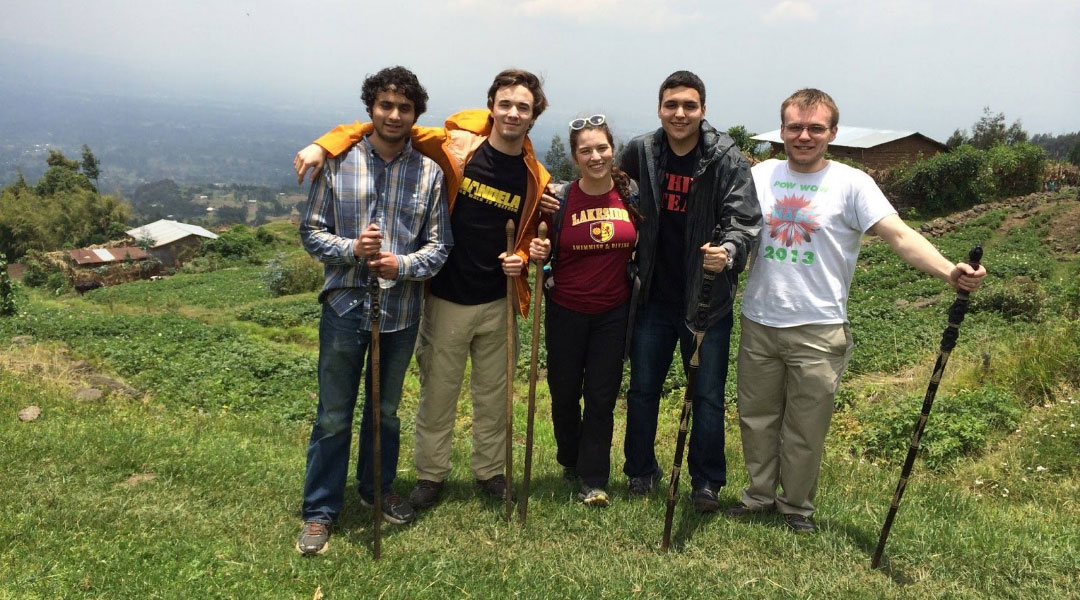By Sophia Wood | Nov 13, 2017
It’s that time of year again. Your friends are trying to decide between South Beach, Punta Cana, and Cancun. They’re already scanning tickets and comparing all-inclusive deals on Kayak. It’s only Thanksgiving, you think. Is it really time to plan Spring Break already?
You know you have other options. You’ve already seen the ads and flyers for Alternative Spring Breaks and wondered whether you should try to be a good citizen rather than drinking your midterms away.
Should you build your resume, or go have fun while you’re young?
I struggled with this decision myself when I was in college. At the time, my only option outside of the traditional binge or the volunteer holiday was an educational trip to Rwanda with my university. For six days, we explored the tiny, landlocked country, learning about their ‘miraculous’ recovery from the 1994 genocide and civil war.
Though we were in country for only about as long as we were in the plane, my Alternative Spring Break in Rwanda was one of the most meaningful – and educational – experiences I had in college. Also, I’ve been asked about it in every job interview I’ve had since then. Why?
Because employers love to see a commitment to lifelong learning and professional development outside of the traditional university and prestigious internship paths.
So why should you learn something new on Spring Break?
After all, you are tired. Midterms have left you drained. Drinking mojitos on the beach is tempting. But you have an amazing opportunity here – and you still have time to capture it.
Most colleges give students 10-14 days off for Spring Break between March and April. Besides Winter Break, which you probably spent stuffing your face with your mom’s cooking (I’m not judging; this is how I spent my winter breaks, too), what other time during the school year do you have almost two weeks off to do something you really want to do? If you go to a school with a J-Term, maybe you feel differently. But for most of us, Spring Break is the time to explore something fun and interesting that you don’t have time to do in the school year (because…school) or in the summer (because internships). And if it can build your resume, even better, right?
How to Find Short-Term International Opportunities for your Spring Break
Did I mention that building your resume doesn’t have to be boring? You don’t have to file papers at a big investment bank to become the most employable candidate in your next job search. If you were already planning on traveling somewhere warm for Spring Break here are a few ways to get the most out of it.
The DIY Method: Reach out to a local NGO or startup and see if you can visit, or shadow someone for a couple days.
If you haven’t discovered the power of the cold email yet, you need to try this. Do a bit of research on organizations in your ideal Spring Break destination that have a mission that you admire. If you think they are really cool, reach out and mention when you will be visiting. Tell them what you think is exciting about their organization, and ask if you could visit their office while you are in their city. I have set up three short-term projects for myself using this method–ranging from visiting a sit-in protest in Puerto Rico to helping out at an indigenous cultural festival in Southern Chile–and I’ve seen many friends do the same.
If you don’t know where to start, try using this email template. At worst, you get no response. But chances are if you express a genuine interest in learning more about their work, they will appreciate the opportunity to discuss your shared interest.
The challenge with this method is that it requires you to be proactive and thoughtful in your planning – and for your organization of choice to do the same. If you don’t already have a network in the city or country you are trying to visit, it may be harder to get a foot in the door with just an email. That’s not to say it’s not worth a try!
The Organized Trip Method: Find a nonprofit that runs Spring Break trips, pay upfront, and leave all the worrying to them.
There are dozens of companies that run organized Spring Breaks in places like Costa Rica, the Dominican Republic, and Mexico that plan out every second of your time so you don’t have to think about it at all. This is basically the opposite of the DIY method, in which you plan everything, from the flights to the food, on your own. Universities often run programs like this as well – re: my Rwanda trip – that include flights, accommodation, food, education/cultural experience, and an organized volunteer activity.
What are the benefits of this method? You don’t really need to plan that much. You’re super busy with school and you don’t feel like figuring out how to get a flight, drive to your Airbnb from the airport, and then figure out where you’ll get all your meals in a new city. This trip will organize everything for you and just bill you for all of it at once. You are guaranteed to do the activities that are listed and you don’t have to worry about emailing organizations or setting up cultural tours. Plus, most employers won’t know exactly what you did so they’ll be satisfied by seeing you volunteered or learned something on Spring Break.
What are the drawbacks? First of all, it’s probably the most expensive. Because these companies or universities organize it all for you, they bill you for their time, as well as for all the flights, accommodations, food etc. Doing it on your own, you almost certainly could find a cheaper way. Second of all, you will have very little time to explore on your own and discover new things that you find particularly interesting. When you are traveling with a large group, you are often limited to what everyone else wants to do, especially if you have already paid for everything up front. Finally, the educational or volunteer experience is unlikely to be relevant to what you study or want to work in. Most voluntourism revolves around manual labor or menial tasks that you probably won’t really enjoy doing. Though it may look good on your resume, you may not actually be building tangible skills that can be applied to your career later on.
The Education Method: Travel to learn a specific new skill that interests you.
From studying Shakespeare in Stratford-Upon-Avon to learning Portuguese in Rio de Janeiro, there are many organizations that offer immersive travel experiences that can help you build your resume during a short period of time. If you’ve been looking for international education experiences, especially shorter term alternatives to study abroad, you’ve certainly already stumbled across several of them. There are so many options out there these days that it can be hard to choose which will give you the most return on investment. What is it that you would like to add to your resume that you aren’t getting from your university programs?
Considering the diversity of the program offerings out there, it is hard to make a single pros and cons list of why to participate in this kind of trip, particularly since every person has their own special reason for wanting to travel and learn. I can tell you mine though.
By the time I chose to go to Rwanda, I had participated in two voluntourism trips, and I felt that the impact I had in 14 to 28 days was really minimal. Furthermore, I realized that in learning from local experts, we were able to disrupt and reverse the traditional system that voluntourism maintains: one that views foreigners as the teacher and locals as the students. An educational program creates a more equal relationship between students and community members, promoting a thought exchange and a dialogue, rather than one-way communication.
No matter which program you choose to participate in, remember that the value of learning from local experts is what sets international learning apart. The opportunity to learn from skilled, local mentors about their expertise is incredibly unique, and will stand out to any employer as a valuable experience that sets you apart. So before you choose a program, ask them where they get their teachers, and what their mentors bring to the table. If you are traveling abroad to learn from professors that could be teaching at your university back home, you might not get as much out of the experience.
Your Spring Break is an opportunity to stand out in your next interview. Don’t let it pass you by.
Committing yourself to learning something during the break doesn’t have to be boring. If you were already planning on traveling, find a way to make the experience unique and meaningful, whether that means volunteering on site or joining an educational trip that puts you in touch with brilliant local mentors. Here are my final two cents:
There are few experiences more humbling and educational than taking the time to listen and learn from local entrepreneurs, activists, and organizers when you are abroad. After a week of learning in Rwanda, I had learned more from observing and listening than I could in an entire semester in a class on conflict resolution. However, I could not have gotten this experience without the local company that acted as an intermediary, introducing our group to people whose trust they had already gained so that we could get a more candid view of the situation in country.
The DIY Method will only get you so far. Even though I’m a huge proponent of solo travel, I cannot discount that I got much more out of my organized educational travel experiences than I ever could have gotten by myself. The right local company can connect you with local people that might be your friends or mentors for life.
Don’t waste another second planning a trip you won’t remember by next year. If you want to find out how to plan a fun Spring Break that also builds your resume, schedule a 15-minute consultation with the VamosA team today!
Sign up for a 15-minute consultation with VamosA CEO, Juan Felipe Cardona, to learn how to make the most of your Spring Break this year!



